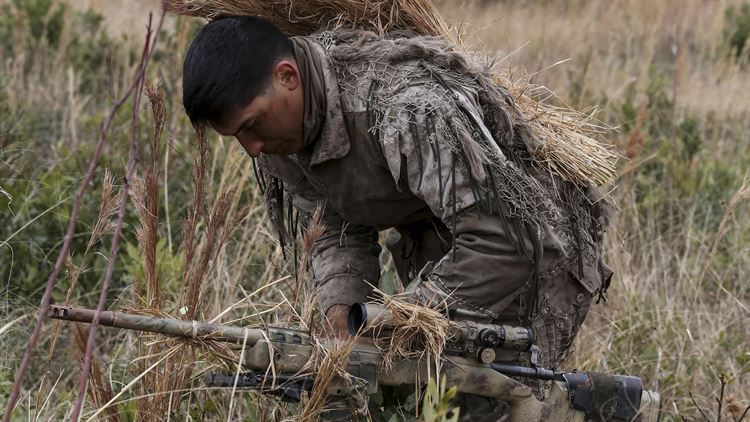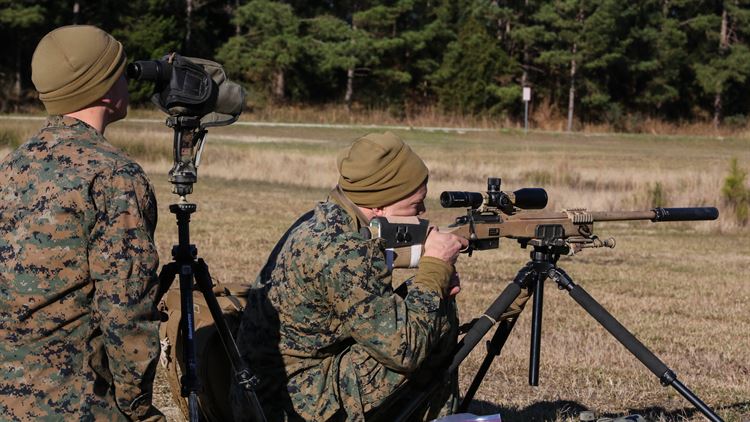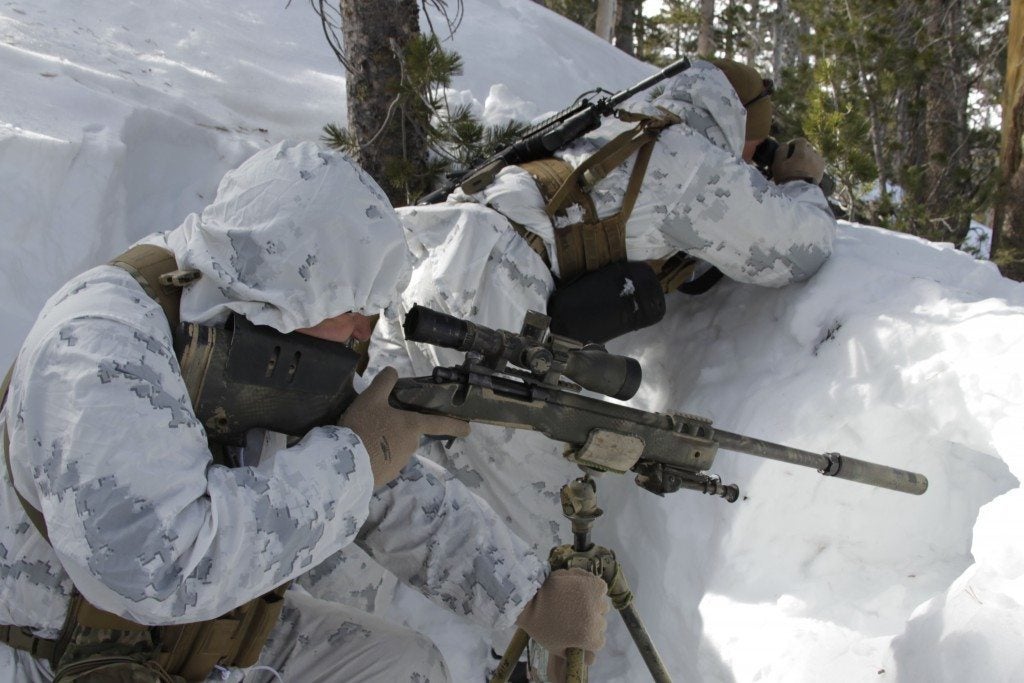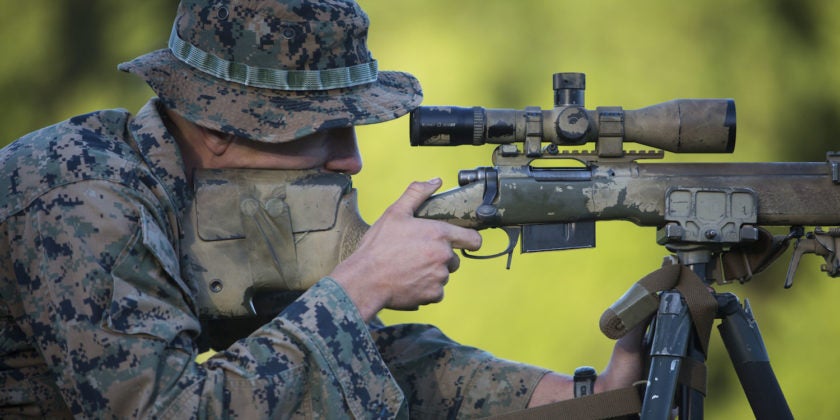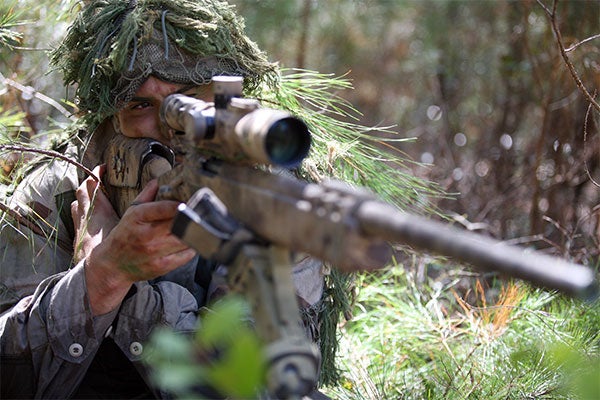Dynamics of a Scout Sniper Platoon Part One
Earlier I covered the topic of the failure rates at the Marine Corps Scout Sniper Basic Course and what the Marines wanted to do to mitigate the failures. I disagreed with the solution to the problem for a number of reasons. In this article I would like to provide some in-depth discussion surrounding the Scout Sniper platoons in the active duty operational component of the Marine Corps, the Fleet. Throughout the years there has been much information dispensed surrounding the platoons and the Scout Snipers within them, some of it true, some of it false, and a number of it just plain rumor. I hope this can clear things up a bit.
To begin with, the definition of a Scout Sniper is a Marine who is highly skilled in field craft and marksmanship, who delivers long range precision fire at selected targets from concealed positions in support of combat operations. These Marines are graduates from the Scout Sniper Basic Course, held at one of the school houses located at Camp Geiger, NC, Camp Pendleton, CA, or Marine Corps Base Quantico in northern Virginia. Operationally they are internal to a Scout Sniper platoon, of which every infantry battalion in the Marine Corps has one. Traditionally these platoons have either been assigned to the Weapons company or the Headquarters & Support company of the battalion. Realistically these platoons work directly for the battalion commander as a battalion asset. Although they are trained in precision marksmanship, one of the larger and more important taskings is an Intelligence, Surveillance, and Reconnaissance (ISR) asset for the battalion. Thus, the platoon is led by a Marine Intelligence officer overall. Captain Jim Land, one of the founders of the current community of Scout Snipers expressed an interesting perspective on this arrangement because, in his opinion, that intelligence officer’s career is going to be built on the value of intelligence that he can provide. Thus, he might forsake the mission of eliminating key enemy combatants when valuable intelligence can be gained. Although there is nothing wrong with this conclusion, Land mentioned that the capability of eliminating enemy targets is so detrimental to morale and is often overlooked in the grand scheme of the battalion’s operations.
Regardless, during OIF and OEF, Scout Sniper platoons have rarely ever operated as a platoon intact. Usually what happens is a platoon is divided into three or more teams consisting of one or more Scout Snipers, than five or six other platoon members. These members carry radios, spare ammunition, light machine guns and really support the mission that the Scout Snipers provide. On deployment these teams are usually dispersed to the different line companies and support their mission, usually going on foot patrols or conducting overwatch missions through satellite patrolling.
There is only one way to get into a Sniper platoon while in a battalion, and that is through an indoctrination process known informally as an Indoc. Everyone in the platoon has to have gone through one to be there, from the Navy corpsmen, the non-infantry radio operators that might be present, and of course all the infantry Marines in the platoon. Indocs usually last a week or two and are essentially one huge haze fest of the participants. As an example, my Indoc started at 3 in the morning with a gear inspection outside the barracks. Following this we immediately conducted a physical fitness test, then immediately a combat fitness test, then an obstacle course run through. All the while being physically challenged in between. Immediately after that, we drew weapons, then bussed out to the field where it continued with Land Navigation, patrolling, radio tests, and a number of other physical tests while getting less than 3 hours of sleep at night. That was lucky, some Indocs don’t see any sleep for the participants whatsoever.
The point of an Indoc isn’t to test whether or not a Marine is an all-star stud when it comes to Infantry tasks. The true intention is to see if that Marine can reach deep down and pull through the challenges he is facing because he wants a spot in that platoon. Most of the tasks in a sniper platoon are completely trainable. You can train a Marine to land nav properly, you can train a Marine to shoot better, you can work out a Marine to perform better physically. But you cannot train motivation into a person, that has to come from within. This is absolutely crucial to working within that sniper platoon because often times you are with a small team, doing incredibly risky missions, having to rely on yourself and each other. There isn’t any room for a slacker or someone who expects others to pull their weight. Of course, during these Indocs, Marines can quit at any time and be done with the course.
The reason why certain infantry Marines go this haze fest is often because they want something more out of being in an infantry battalion. Working in an infantry squad or platoon sometimes can become monotonous at times. In addition, you usually have the full array of characters to deal with. You have borderline idiots that should have never enlisted, you have the mediocre infantrymen that can be relied upon but nothing much more. And you also have the performers that are essential to the mission. Many of these top performers are content with their status in their platoon or squad and like to keep it that way. However, others just want more out of their careers, they want to be pushed in ways that just aren’t possible in a line platoon. Thus, they see an Indoc coming up and they jump at the opportunity. However, I would also like to add that there is a very strong sense of loyalty that exists in the grunts. I’ve heard many an infantryman who commented that he would have loved to try out for an Indoc, but he owed it to his guys to stay behind and be with them. Indeed, when I was accepted into 1/9s Sniper platoon, although I still remained close friends with my colleagues in Charlie company, I did feel a sort of animosity of “You left us to be with them”.
The flip side of the coin in a sniper platoon is that you essentially have a platoon full of guys that want nothing more than to be the best at their job. Coupled with the prospect of going to the Basic Course through selection of the best possible candidate, you get a sort of dog eat dog mentality. Everyone is trying to stomp over each other, to give a reason why they should go to school over the other guy. Then you have the whole HOG versus PIG culture. HOG stands for Hunters of Gunmen, and PIG stands for Professionally Instructed Gunman. HOG obviously being the school trained Scout Snipers, and PIG being the Marines that have yet to go to school. Of course, the HOGs are always in charge of the PIGs as they are the team leaders and Chief Scouts. Each platoon has one Chief Scout which is essentially the senior most Scout Sniper who leads the training regime. What usually happens is you get the HOGs dominating the PIGs, almost seeing them as lesser beings at times. Sometimes this results in unusual amounts of hazing, some of it justifiable, and some of it unjustifiable for the sake of enjoyment at the expense of the PIGs. Of course, this perpetuates a culture of guys going to school, then returning as HOGs, to slay more PIGs.
Either way you slice it, the fact remains that usually sniper platoon Marines are some of the best trained, smartest, most physically fit, and most capable Marines in an entire infantry battalion. I like to compare to thinking of the line companies as high school, and the Sniper platoons as working at the collegiate level. The things you learn and work with in a Sniper platoon far outmatch any amount of training that you could get in a line company. In addition, the sheer level of work being done in a Sniper platoon is almost equivalent to that of a squad leader or even a platoon commander. In fact, often times Sniper platoon members have to work hand in hand with officers such as platoon, company, even battalion commanders at the tactical level. Things like calling in Arty/CAS, patrolling, weapons manipulations, ballistics knowledge, operating radios are not only expected but demanded of at the lowest level in a Sniper platoon. These skill sets are often not even given a second thought at the rifleman or even team leader level.
From an experience standpoint, there are two ways infantry Marines typically enter a sniper platoon. The first way is either as a Boot checking into the Fleet or through completing an Indoc as a Boot (Marine New Join). The second way is at a more experienced level after a deployment or even as an NCO later on in their careers. Differences between these two circumstances is vast because usually Boots will have a much harder time in the platoon as PIGs. It is bad enough being a Boot in the Fleet, but it becomes even worse when in a sniper platoon. Not only are the HOGs harder on you, but even the PIGs now have someone to direct their hate towards. What most commonly happens is that a Sniper platoon is low on numbers, and essentially feeds off the latest Boot drop coming into the battalion. Often the platoon sergeant will just take the highest GT score performers from the incoming Boots and have them assigned to Snipers until they can either pass or fail an Indoc. From the Boot perspective, although they’ll be treated worse, this is a pretty unique opportunity coming directly from SOI in such an advanced position. And if they succeed in the platoon, they’ve got a much better headstart than any of the more experienced PIGs that come into the platoon after a deployment.
For the regular infantrymen that decide to try out Snipers after a deployment or two, much of their decision has to do with what I mentioned earlier. They usually want something more out of their careers than what the line companies can offer them. In addition, getting into Snipers can be much easier than trying out for the Basic Reconnaissance Course (BRC), or for MARSOC as well because Snipers is all in house, in the battalion. For me personally, I’d always wanted to be in Snipers but felt like I needed more experience in the Fleet before I made the plunge. In addition, when I got back from my first deployment I was stuck in my companies armory, which was a miserable experience you can read about here. Honestly, for any potential infantry Marines or current infantrymen reading this, I would highly advise going down this route. Get your start in the grunts with a line company (or Crunchie as Sniper platoons refer to as), learn the ABCs of how a team/squad/platoon operates at the most basic level. Get a deployment under your belt, and then try out for Snipers. Not only are you treated with more respect in the platoon when you pass the Indoc (no matter if you’re a Boot, salt dog, or SNCO, everyone is hazed equally in an Indoc), but you already have a running head-start when it comes to learning the ins and outs of the particular operations. You already fully understand the basics of being an infantryman so you don’t need to be learning that in addition to your new job specialty if you were a Boot fresh out of SOI. In addition, you know the intricacies and subtle details of how a line company operates, you also have friends and contacts in those companies so your mission of supporting them becomes a little more personal and worthwhile.

